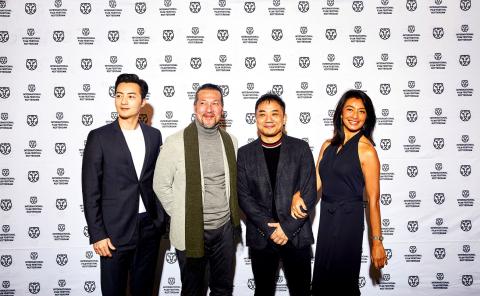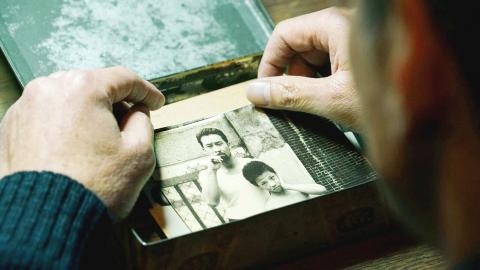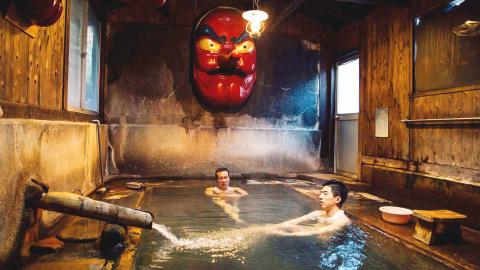Growing up, Taiwanese filmmaker Hsiao Ya-chuan (蕭雅全) shared a rocky relationship with his father. Solemn and overly frugal, his father was consumed with saving money, and faced difficulties communicating with his children, recalls the now 50-year-old.
“He was a very thrifty person because he grew up in very poor circumstances. But he didn’t know how to talk about his inner emotions, about his own sorrow and happiness, as though his entire life had been repressed by the lack of money,” Hsiao says.
These memories of his late father, who passed away five years ago, were what inspired the director to make his third feature Father to Son (范保德), which made its world premiere at the recently-concluded International Film Festival Rotterdam (IFFR). The fictional film was nominated for the VPRO Big Screen Award, alongside Taiwanese-Dutch coproduction An Impossibly Small Object by David Verbeek, though it did not win. It is set for a commercial release in Taiwan in September.

photo courtesy of Hsiao Ya-chuan
Father to Son follows protagonist Van Pao-te (Michael JQ Huang, 黃仲崑), who realizes on his 60th birthday that he is dying. With time running out, he heads to Japan with his own son in search of his father who abandoned him 50 years previously. At the same time, a young man with a mysterious connection to Van’s past travels from Hong Kong to Taiwan.
Much of Father to Son fleets between the past and the present over the course of its 115-minute running time — the film charts the complex relationships between intergenerational pairs of father and son, against the backdrop of Taiwan’s tumultuous history under colonial rule in the last century.
“Taiwan has a very complicated history — first it belonged to China, then it belonged to Japan and before that it was under Dutch rule. The search for the father in the film parallels a similar search for identity in the hearts of many Taiwanese,” Hsiao says.

photo courtesy of Hsiao Ya-chuan
As the father of a 13-year-old son and a 16-year-old daughter himself, the director says he is determined not to follow in his late father’s footsteps when it comes to his own children.
“My father’s frugality created a sense of insecurity in me, as if the family could run out of money anytime. There was a feeling of poverty, where we never had enough to do the same things other people could. When I had my own family, I really hoped my children would not have the same feeling.”
Yet Hsiao admits that try as he might, the apple never falls far from the tree, as the characters in his film demonstrate.

photo courtesy of Hsiao Ya-chuan
“We don’t know if it’s because of our genes or the environment we’ve grown up in since [we were] young, but it’s always difficult to break away from the influence of our families. My friends and I realize that strangely, as we grow older, we are becoming more like our fathers.”
Father to Son marks Hsiao’s return to the silver screen after an eight-year-absence since his second feature, Taipei Exchanges (第36個故事, 2010), which was released a decade after his debut Mirror Image (命帶追逐, 2000). The director says these prolonged filmmaking droughts were not due to creative blocks; instead he was busy shooting television commercials amid a perceived slowdown in the Taiwanese film industry.
“The atmosphere for movies was not as great before. The industry for television commercials is more matured, so many people who liked to shoot films went to do that. But the film industry has been getting better recently, so a lot of older people like me who turned to commercials are now returning to film.”
And like his two previous films, Father to Son is also the third of Hsiao’s films to have legendary Taiwanese filmmaker Hou Hsiao-hsien (侯孝賢) on board as executive producer. Hsiao served as Hou’s assistant director on the set of his 1998 film, Flowers of Shanghai (海上花).
“After I finished working on Flowers of Shanghai, I wanted to make my own film (Mirror Image) so I invited Hou to be my supervisor and he agreed. It was a very natural process, him advising me and us working together. And it became a habit,” he says.
With the duo having collaborated on a number of successful productions together, one might wonder if Hsiao often gets compared to the older Taiwanese maestro by outsiders, or perhaps even feel overshadowed by his mentor.
“Every author is afraid of being like another person. Hou Hsiao-hsien is a very renowned and powerful director and because he has always supported me, my biggest fear is to be like him. But of course, we have creative differences when it comes to the aesthetics of film,” says Hsiao, adding that they always work things out eventually.
“He is an elder who takes very good care of the younger generation, and I feel very honoured that he is looking after me,” Hsiao says. “I would never think that he is blocking my spotlight.”

Taiwan has next to no political engagement in Myanmar, either with the ruling military junta nor the dozens of armed groups who’ve in the last five years taken over around two-thirds of the nation’s territory in a sprawling, patchwork civil war. But early last month, the leader of one relatively minor Burmese revolutionary faction, General Nerdah Bomya, who is also an alleged war criminal, made a low key visit to Taipei, where he met with a member of President William Lai’s (賴清德) staff, a retired Taiwanese military official and several academics. “I feel like Taiwan is a good example of

March 2 to March 8 Gunfire rang out along the shore of the frontline island of Lieyu (烈嶼) on a foggy afternoon on March 7, 1987. By the time it was over, about 20 unarmed Vietnamese refugees — men, women, elderly and children — were dead. They were hastily buried, followed by decades of silence. Months later, opposition politicians and journalists tried to uncover what had happened, but conflicting accounts only deepened the confusion. One version suggested that government troops had mistakenly killed their own operatives attempting to return home from Vietnam. The military maintained that the

Jacques Poissant’s suffering stopped the day he asked his daughter if it would be “cowardly to ask to be helped to die.” The retired Canadian insurance adviser was 93, and “was wasting away” after a long battle with prostate cancer. “He no longer had any zest for life,” Josee Poissant said. Last year her mother made the same choice at 96 when she realized she would not be getting out of hospital. She died surrounded by her children and their partners listening to the music she loved. “She was at peace. She sang until she went to sleep.” Josee Poissant remembers it as a beautiful

Before the last section of the round-the-island railway was electrified, one old blue train still chugged back and forth between Pingtung County’s Fangliao (枋寮) and Taitung (台東) stations once a day. It was so slow, was so hot (it had no air conditioning) and covered such a short distance, that the low fare still failed to attract many riders. This relic of the past was finally retired when the South Link Line was fully electrified on Dec. 23, 2020. A wave of nostalgia surrounded the termination of the Ordinary Train service, as these train carriages had been in use for decades